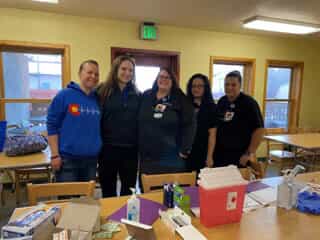SLVH Educates Public about the Flu
SLV Health
The Center for Disease Control (CDC) estimates that so far this flu season there have been at least 15 million flu illnesses, 140,000 hospitalizations, and 8,200 deaths from flu. Colorado is amongst 35 states that are experiencing high flu activity levels. Symptoms of the flu can include fever/chills, cough, sore throat, runny or stuffy nose, body aches, headaches, and fatigue. Some may also experience vomiting and diarrhea, but this is more common in children than in adults. Those who have chronic medical conditions/diseases, weakened immune systems, blood disorders, are less than two years of age, or greater than 65 years of age are all at an increased risk of flu related complications.

https://www.cdc.gov/flu/weekly/index.htm#ILIActivityMap
If you, or a person you care for, seek medical care for flu like symptoms it is important to inform your care provider of your personal medical history, your medical conditions, any medications you take, and any contact you have had with a sick person. Additionally, be prepared to inform your provider of the symptoms you are experiencing and how long you have had those symptoms. Testing for the flu includes a swab in the nose to collect nasal secretions; this may be uncomfortable, but should not be harmful. If you are experiencing difficulty breathing, a fever that does not respond to treatment, or are unable to drink/hold down fluids it may be necessary to seek emergency care. Less severe symptoms such as runny nose, cough, and mild body aches can be equally managed in a clinic where there may be less wait time. There is no specific medicine that can completely get rid of the flu, but there are certain antiviral medicines that can help limit the length and severity of illness. Although antivirals are recommended, their use depends on factors such as the length of symptoms and other health complications that may be present, so they will be prescribed at the discretion of the provider you see. General treatment for the flu is based on controlling symptoms with the use of anti-fever medications, fluids, and rest, but it is always best to follow your provider’s recommendations.
If you seek emergency care, please remember that the Emergency Department is continuously managing multiple patients with varying ailments. The order of being seen is not based on the order of arrival, but is based on the most life threatening conditions being seen first. Due to the unpredictability of the Emergency Department it is not possible to determine how long your visit will take or where you will be placed in terms of rooming. However, staff genuinely care about your concerns and are highly trained in prompt identification of life threatening conditions. Also note that staff may wear masks and/or other personal protective equipment in attempt to isolate the illness and prevent it from spreading to others.
According to a hospital administrator, during the month of January, 2020, the SLV Health Regional Medical Center (RMC) Emergency Department in Alamosa experienced record high numbers, with many very sick patients from all walks of life with a variety of symptoms. The RMC is a certified Trauma Level III regional hospital and is able to care for a wide range of patients such as multiple trauma accidents, a premature baby delivered safely, pneumonia, RSV and other emergency surgeries. Over a dozen patients were admitted with severe flu like symptoms in January.
If everyone does their part, we can all work together to keep the SLV as healthy of a community as possible, especially during flu season.
- Wash your hands, often, use soap or alcohol based hand rubs.
- Stay away from people who are sick. If you are sick, please try to stay away from healthy people or use a mask when in the public.
- Cough or sneeze into your elbow. Wash hands after using a tissue. Disinfect high touch objects.
- Get your flu vaccine! It’s not too late! The effectiveness of the flu vaccine varies depending on multiple factors such as age, overall health of the recipient, the types of influenza circulating, and the degree of similarity between the vaccine and circulating influenza strains. Even though the results may vary, vaccination provides important protection against influenza and its potential complications.
As of Jan 18, 2020, in Colorado there have been 1,082 hospitalizations from the flu with 20 of those reported in the San Luis Valley. It’s not too late to get your flu shot! Vaccines are still available at locations across the San Luis Valley, including at the clinics at San Luis Valley Health where no appointment is needed.

A team of volunteers from SLV Health delivered free flu shots to residents of La Puente Shelter in Alamosa in January. L to R: Andrea Cherne, Jessica Garcia, Shawna Glynn-Apodaca, Tamara Valdez, and Rafelita Atencio